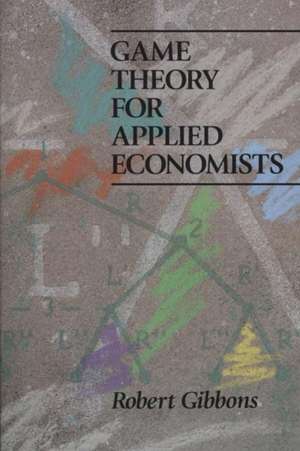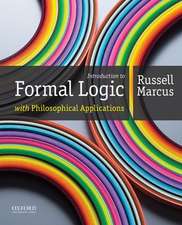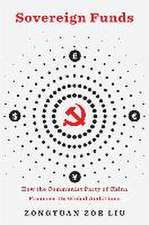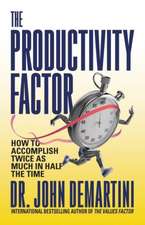Game Theory for Applied Economists
Autor Robert Gibbonsen Limba Engleză Paperback – 31 iul 1992
Preț: 478.20 lei
Nou
Puncte Express: 717
Preț estimativ în valută:
91.50€ • 95.54$ • 75.73£
91.50€ • 95.54$ • 75.73£
Carte tipărită la comandă
Livrare economică 04-18 aprilie
Preluare comenzi: 021 569.72.76
Specificații
ISBN-13: 9780691003955
ISBN-10: 0691003955
Pagini: 288
Dimensiuni: 155 x 231 x 18 mm
Greutate: 0.41 kg
Ediția:New.
Editura: Princeton University Press
Locul publicării:Princeton, United States
ISBN-10: 0691003955
Pagini: 288
Dimensiuni: 155 x 231 x 18 mm
Greutate: 0.41 kg
Ediția:New.
Editura: Princeton University Press
Locul publicării:Princeton, United States
Cuprins
| 1 | Static Games of Complete Information | 1 |
| 1.1 | Basic Theory: Narmal-Form Games and Nash Equilibrium | 2 |
| 1.1.A | Normal-Form Representation of Games | 2 |
| 1.1.B | Iterated Elimination of Strictly Dominated Strategies | 4 |
| 1.1.C | Motivation and Definition of Nash Equilibriuin | 8 |
| 1.2 | Applications | 14 |
| 1.2.A | Cournot Model of Duopoly | 14 |
| 1.2.B | Bertrand Model of Duopoly | 21 |
| 1.2.C | Final-Offer Arbitration | 22 |
| 1.2.D | The Problem of the Commons | 27 |
| 1.3 | Advanced Theory: Mixed Strategies and Existence of Equilibriutn | 29 |
| 1.3.A | Mixed Strategies | 29 |
| 1.3.B | Existence of Nash Equilibrium | 33 |
| 2 | Dynamic Games of Complete Information | 55 |
| 2.1 | Dynamic Games of Complete and Perfect Information | 57 |
| 2.1.A | Theory: Backwards Induction | 57 |
| 2.1.B | Stackelberg Model of Duopoly | 61 |
| 2.1.C | Wages and Employment in a Unionized Firm | 64 |
| 2.1.D | Sequential Bargaining | 68 |
| 2.2 | Two-Stage Games of Complete but Imperfect Information | 71 |
| 2.2.A | Theory: Subgame Perfection | 71 |
| 2.2.B | Bank Runs | 73 |
| 2.2.C | Tariffs and Imperfect International Competition | 75 |
| 2.2.D | Tournaments | 79 |
| 2.3 | Repeated Games | 82 |
| 2.3.A | Theory: Two-Stage Repeated Games | 82 |
| 2.3.B | Theory: Infinitely Repeated Games | 88 |
| 2.3.C | Collusion between Cournot Duopolists | 102 |
| 2.3.D | Efficiency Wages | 107 |
| 2.3.E | Time-Consistent Monetary Policy | 112 |
| 2.4 | Dynamic Games of Complete but Imperfect Information | 115 |
| 2.4.A | Extensive-Form Representation of Games | 115 |
| 2.4.B | Subgame-Perfect Nash Equilibriuin | 122 |
| 3 | Static Games of Incomplete Information | 143 |
| 3.1 | Theory: Static Bayesian Ganies and Bayesian Nash Equilibrium | 144 |
| 3.1.A | An Example: Cournot Competition under Asymmetric Information | 144 |
| 3.1.B | Normal-Form Representation of Static Bayesian Games | 146 |
| 3.1.C | Definition of Bayesian Nash Equilibrium | 149 |
| 3.2 | Applications | 152 |
| 3.2.A | Mixed Strategies Revisited | 152 |
| 3.2.B | An Auction | 155 |
| 3.2.C | A Double Auction | 158 |
| 3.3 | The Revelation Principle | 164 |
| 4 | Dynamic Games of Incomplete Information | 173 |
| 4.1 | Introduction to Perfect Bayesian Equilibrium | 175 |
| 4.2 | Signaling Games | 183 |
| 4.2.A | Perfect Bayesian Equilibrium in Signaling Games | 183 |
| 4.2.B | Job-Market Signaling | 190 |
| 4.2.C | Corporate Investment and Capital Structure | 205 |
| 4.2.D | Monetary Policy | 208 |
| 4.3 | Other Applications of Perfect Bayesian Equilibrium | 210 |
| 4.3.A | Cheap-Talk Games | 210 |
| 4.3.B | Sequential Bargaining under Asymmetric Information | 218 |
| 4.3.C | Reputation in the Finitely Repeated Prisoners' Dilemnia | 224 |
| 4.4 | Refinements of Perfect Bayesian Equilibrium | 233 |
| Index | 257 |
Recenzii
Lucid and detailed introduction to game theory in an explicitly economic context.























